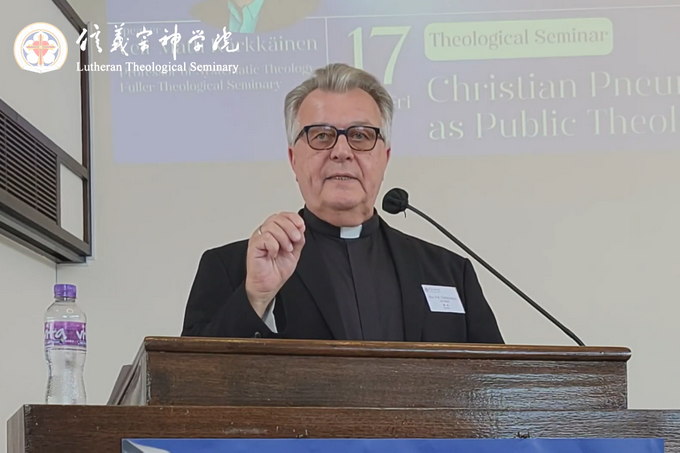On October 17, Dr. Veli-Matti Kärkkäinen, professor of Systematic Theology at Fuller Theological Seminary, delivered a lecture titled "The Spirit of God in the Public Space" at the Lutheran Theological Seminary (Hong Kong). The event was part of the seminary's "2025 Theological Lecture" series, with this session focusing on "Christian Pneumatology as Public Theology."
Dr. Kärkkäinen introduced what he called a "world-embracing, multi-layered pneumatology"—a framework that expands traditional understandings of the Holy Spirit's work. Traditional theology, he noted, has often confined the Spirit's activity to personal salvation, individual spirituality, and church life. His approach takes a broader view, proposing that the Spirit is actively at work across all dimensions of existence: in the cosmos, culture, politics, science, and even within other world religions.
According to Dr. Kärkkäinen, a major obstacle to this expanded vision has been theology's historical struggle with what he described as the tension between "continuity and discontinuity" in the Spirit's work. Too often, he argued, theologians have drawn sharp lines separating the Spirit's redemptive work in the church from its creative activity in the wider world. Drawing on the work of theologian Wolfhart Pannenberg, Dr. Kärkkäinen suggested that the Spirit's role as the creative source of all life provides essential grounding for understanding its work in human redemption. Rather than viewing these as separate domains, he proposed a model of "dynamic mutuality" in which the Spirit's universal and particular works are interconnected dimensions of a single divine ministry.
Dr. Kärkkäinen advocated for what he termed a "post-critical" theological method to navigate this expanded scope in dialogue with modern science. This approach, he explained, values critical inquiry from the Enlightenment tradition while challenging the naturalist assumptions that dismiss spiritual realities. The goal is to engage secular culture and science "critically but sympathetically," without compromising theological commitments.
The lecture offered several concrete applications of this framework. Addressing social issues, Dr. Kärkkäinen described the Holy Spirit as a "spirit of justice-making," active in confronting poverty and racism and in promoting peace—what he called "political holiness." Turning to science, he referenced Martin Luther's image of the Spirit "brooding" over creation and Pannenberg's concept of the Spirit as a "force field." These metaphors, he suggested, open space for dialogue that recognizes the Spirit as the life-giving principle in the cosmos, with direct relevance to environmental concerns.
Dr. Kärkkäinen also explored the Spirit's presence in other religious traditions, pointing to potential connections between Christian pneumatology and concepts like qi in Chinese thought. He noted that some of his students have begun comparative work in this area. Near the end of his lecture, he issued a challenge to academic theology: the discipline must take seriously the reality of cosmic powers and spiritual beings. This remains a pressing concern for many Christians in the Global South, he observed, even though Western academia has largely marginalized such questions.












